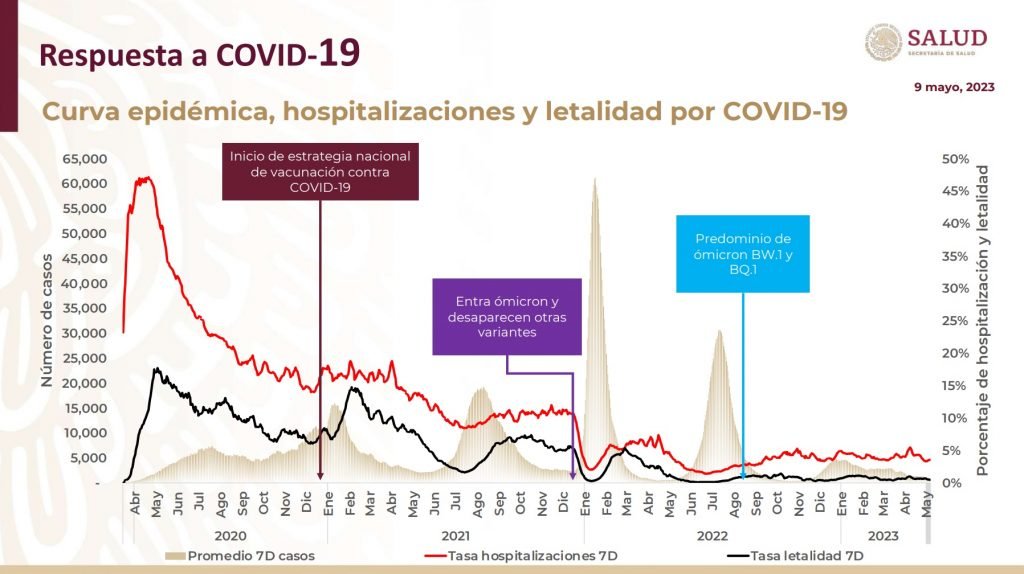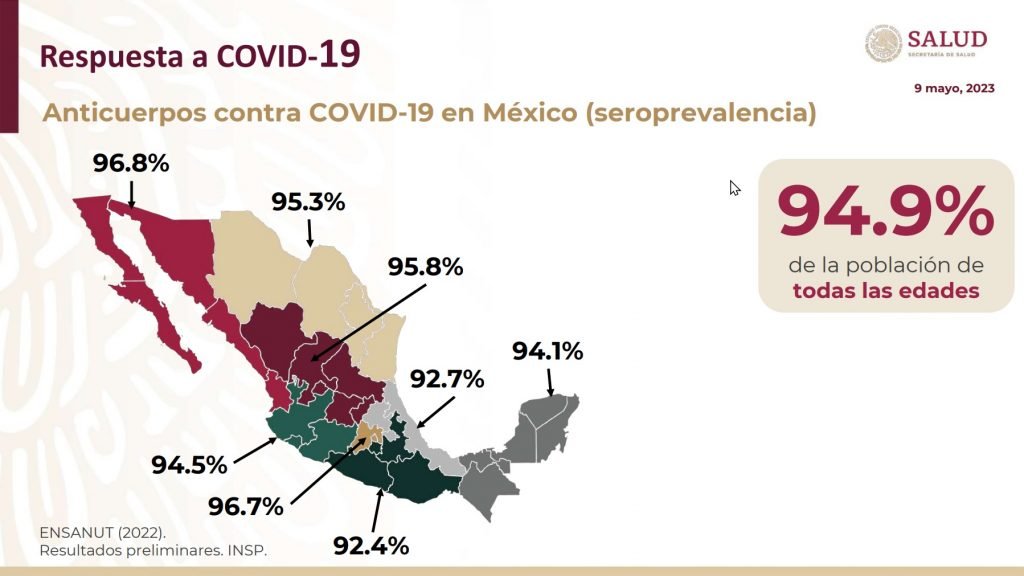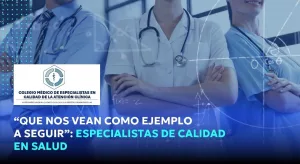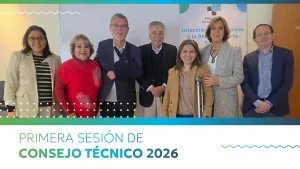Durante la conferencia de prensa matutina de este 9 de mayo de 2023 que encabezó el presidente Andrés Manuel López Obrador, y ante el secretario de Salud, Jorge Alcocer Varela, el titular de la Subsecretaría de Prevención y Promoción de la Salud (SPPS), Hugo López-Gatell Ramírez anunció que México pone fin a la emergencia sanitaria por COVID-19, ya que cumple las características que establece la Organización Mundial de la Salud (OMS) para suspenderla, como son los altos niveles de inmunidad por infección o vacunación, y la disminución en el número de casos, hospitalizaciones y decesos.
Declaratoria de fin de la pandemia del COVID-19

El titular de la SPPS detalló que el primer mandatario firmó el decreto que pone fin a la vigencia del decreto original del 23 de marzo de 2020, en el que se estableció la situación de emergencia sanitaria asociada a COVID-19.
Con el nuevo decreto que pone fin a la emergencia también se suspenden las vigencias de distintos acuerdos que en su momento emitió el Consejo de Salubridad General (CSG) y el secretario de Salud para instruir la acción extraordinaria en la materia.

López-Gatell precisó que, en promedio, casi 95% de las personas en México posee anticuerpos contra el virus SARS-CoV-2, ya sea porque se contagió y enfermó, o porque fue vacunada; lo anterior, conforme a los resultados preliminares de la Encuesta Nacional de Salud y Nutrición 2022 (Ensanut 2022).
Puntualizó que las variantes actuales del virus tienen menor capacidad de causar daño grave y el manejo clínico de pacientes ha mejorado con base en grupos de riesgo y presentación de casos.
Enfermedad endémica y no epidémica
Dijo que con la terminación de la emergencia sanitaria se establece un plan de gestión de largo plazo, que considera a COVID-19 como una enfermedad endémica y no epidémica; es decir, que estará presente entre la población por siempre, con predominio en la temporada invernal.
Recomendaciones generales
Este plan se compone de 7 elementos que incluyen las siguientes recomendaciones generales:
- uso correcto de cubrebocas,
- incapacidades laborales,
- intercambio de servicios y continuidad;
- vigilancia, monitoreo y alertamiento;
- reconversión hospitalaria;
- Programa de Vacunación Universal (PVU);
- manejo clínico y actualización de planes de respuesta.
El subsecretario de Prevención y Promoción de la Salud abundó en que durante la segunda ola de la pandemia fueron reconvertidas 74 mil camas, 11 mil de ellas con ventilador. “Es la experiencia más grande de reconversión hospitalaria que se haya tenido en el mundo”.
IMSS, institución que más contribuyó a la reconversión
El Instituto Mexicano del Seguro Social (IMSS) fue la institución que más contribuyó a la reconversión, “lo que nos lleva a sentar las bases técnicas para este proceso ante futuras epidemias. Mantendremos actualizado el plan de preparación, respuesta y recuperación ante emergencias para que sea un instrumento que sirva ante cualquier nueva epidemia”, subrayó.
El 4 mayo, la OMS determinó que la enfermedad de COVID-19 es ahora un problema de salud establecido y persistente que ya no constituye una emergencia de salud pública de importancia internacional, ante los altos niveles de inmunidad y la tendencia decreciente en la aparición de casos, hospitalizaciones y defunciones.
Mexico ends health emergency by COVID-19 complying with WHO standards
During the morning press conference on May 9, 2023 led by President Andrés Manuel López Obrador, and before the Secretary of Health, Jorge Alcocer Varela, the head of the Undersecretary for Health Prevention and Promotion (SPPS), Hugo López-Gatell Ramírez announced that Mexico is ending the health emergency due to COVID-19, since it meets the characteristics established by the World Health Organization (WHO) to suspend it, such as high levels of immunity due to infection or vaccination, and the decrease in the number of cases, hospitalizations and deaths.Declaration of end of the COVID-19 pandemic
The head of the SPPS explained that the president signed the decree that puts an end to the validity of the original decree of March 23, 2020, in which the health emergency situation associated with COVID-19 was established. With the new decree that puts an end to the emergency, the validity of different agreements that were issued at the time by the General Health Council (CSG) and the Secretary of Health to instruct extraordinary action on the matter are also suspended. López-Gatell specified that, on average, almost 95% of people in Mexico have antibodies against the SARS-CoV-2 virus, either because they were infected and sick, or because they were vaccinated; the foregoing, according to the preliminary results of the 2022 National Health and Nutrition Survey (Ensanut 2022). He pointed out that the current variants of the virus have less capacity to cause serious damage and the clinical management of patients has improved based on risk groups and presentation of cases.Endemic and non-epidemic disease
He said that with the end of the health emergency, a long-term management plan is established, which considers COVID-19 as an endemic and not an epidemic disease; that is, it will be present among the population forever, with a predominance in the winter season.General recommendations
This plan is made up of 7 elements that include the following general recommendations:- correct use of mouth covers, work disabilities,
- service exchange and continuity;
- surveillance, monitoring and warning;
- hospital conversion;
- Universal Vaccination Program (PVU);
- clinical management
- update of response plans.






